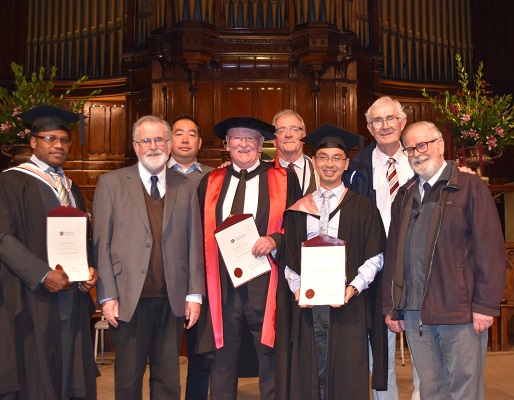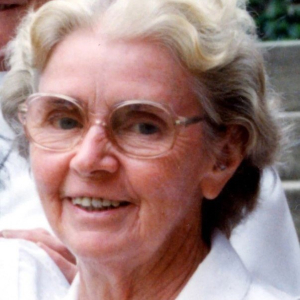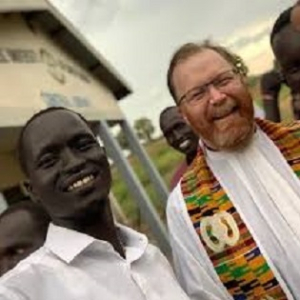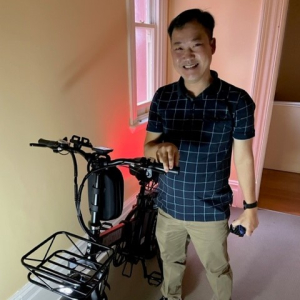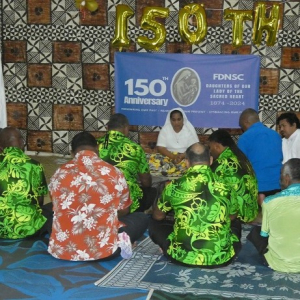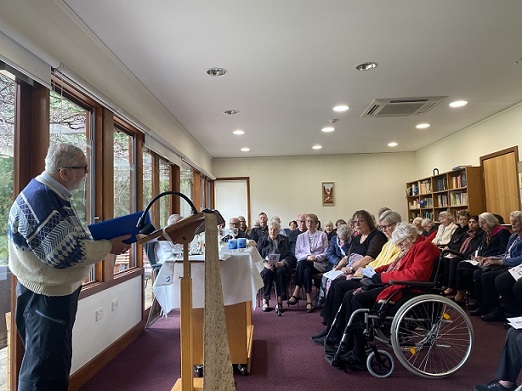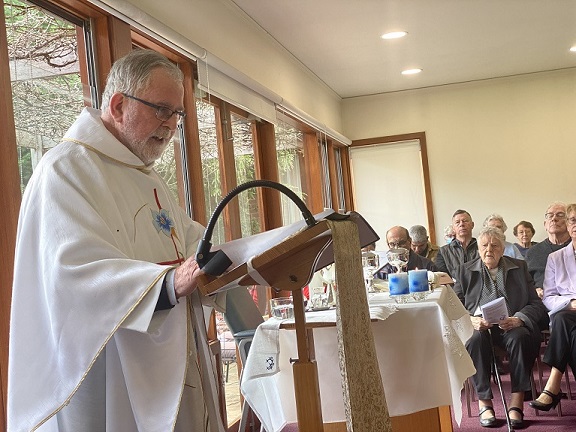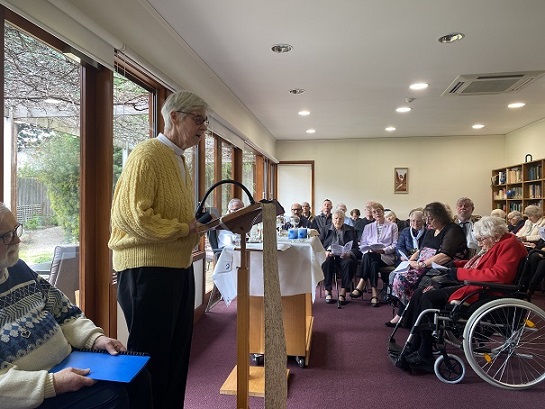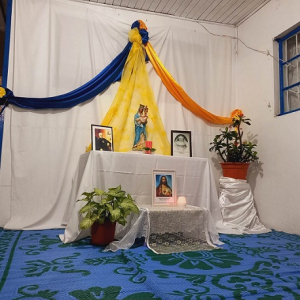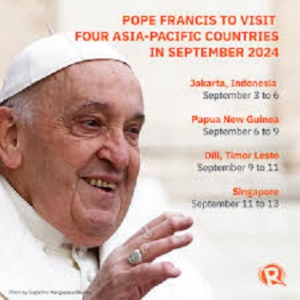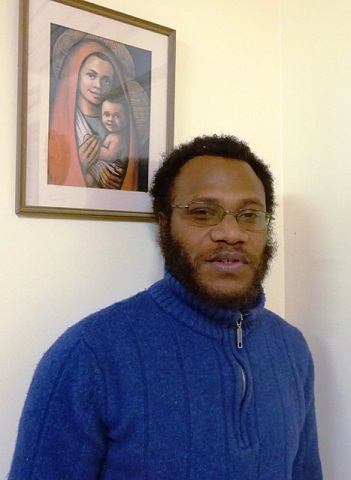Peter MALONE
Instigators, The
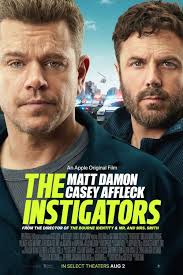
THE INSTIGATORS
US, 2024, 101 minutes, Colour.
Matt Damon, Casey Affleck, Hong Chau, Jack Harlow, Michael Stuhlbarg, Alfred Molina, Ron Perlman, Toby Jones, Ronnie Cho, Ving Rhames, Paul Walter Hauser.
Directed by Doug Liman.
This is a robbery story with a very strong cast, intended as an enjoyable pastime. Audiences might like to ponder who the actual instigators are in this story and what they were instigating in reality!
The setup is a buddy film, but two unlikely characters forced to work together, involved in a high-stakes robbery. We are introduced to the two, Matt Damon, always a solid presence, in therapy with his psychiatrist, Hong Chau, wanting an exact amount of money to be able to reunite with his son. By contrast, there is the alcoholic ex-conman played by Casey Affleck.
The situation is an election in Boston, Ron Perlman as the Mayor, corrupt, aiming for re-election against his ethnic rival, played by Ronnie Cho. The mayor is surrounded by his yes-men, especially his lawyer, played by Toby Jones.
In the meantime, there is a range of criminals played by Michael Stuhlbarg and Alfred Molina. They have the plan for the buddies, with the young nephew, to rob the vans carrying the money before it is delivered to the mayor.
They might be instigators but, of course, everything goes wrong. The money has already been transferred, they go into the Mayor’s office, still his keepsake with the number of his safe, a shootout, and escape in the van, chases through the city…
Ving Rhames appears as a corrupt police investigator.
When they are taken, there is a siege situation and the therapist is invited into mediate – enabling her to get out with some of the money to pay off Damon’s debt in view of a happy ending, and Casey Affleck escaping to Canada. The reason that they do escape and there is a happy ending is that the new Mayor, coming into possession of the money, anonymous money from the previous corrupt Mayor, is not declared and they can keep it as long as the two are not arrested and brought to court. So, off to Canada and happy ending.
The director is Doug Lyman (Bourne Identity, Jumper, Edge of Tomorrow), skilled at some action shows – but this is more relaxed for streaming audience.
- Title? Robberies? Who were the instigators?
- The Boston setting, the neighbourhoods, public spaces, the streets, car chases and pursuits, the mayor’s office, meeting places planning the robberies? The election – the rooms, corridors, social areas, the strong room with the safe? The musical score?
- The situation, introduction to Rory, therapy with the doctor, her questions, his responses, his crisis? The situation with his son? The need for money?
- The setting up of the robbery, the mind behind the robbery, his moods, dealing with his men, with Scalvo, young and inexperienced, the connections with Richie at the bakery? The plan, the testing of Rory and Cobby, details of the plan? The corrupt Mayor, as target, corruption and money?
- Rory and Cobby, personalities, interactions, slow, the as matter-of-fact, the precise amount needed, the bargain with the boss?
- The setup, the vans, the election night, the television news, the alternate candidate, Rory praising him, the presumption the corrupt Mayor would win? The scenes of the Mayor, his staff, tough tactics, reliance on his attorney, Alan Flynn?
- The comedy of the robbery gone wrong, the timing, the amount of money, the earlier van taking the money, guns and shooting, confrontations, the little money in the safe, Rory and the bag, the shooting, the deaths, Scalvo dead? Cobby wounded?
- Going to the doctor, the pressure on her, the discussion about her being a hostage, going with them, treating the wound, the consequences? Her later being chosen as the mediator for the hostages, her bargain with Rory and getting the money out under her uniform, helping Rory with his debt – but continually asking how he was feeling, especially during the negotiations? And copy finally returning to her?
- The mayor, his cronies, the defeat, Cobby with the money, the various positions, having the code number to the mayor’s safe, his not being able to remember, the various combinations?
- The boss, fleeing, contact with Richie, Richie and the interviews, sending the henchmen, tracking down Rory and Cobby, their escaping him? Frank, in the pay of the mayor, the dealings with Richie, his continued pursuit of Rory and Cobby? The finale and their doing the deal with him? And the final credits seen of the boss dead in the snow?
- The vans, the pursuits, the desperation of the chase, guns, Cobby wounded again, his complaints?
- The confrontation with the mayor, his desperation, the arrest, in jail?
- The return to the scene of the crime, Alan Flynn present, to do a bargain deal, opening the safe, all the money? The dilemma, the doctor as mediator? The device for escape, throwing the safes out the window, the scattering of money everywhere, the crowd racing for the money?
- Rory, finally, deciding to give himself up? The new mayor – and the information about the contracts, the new potential corruption? The two men let out, Rory going to see his son, reconciliation?
I Saw the TV Glow
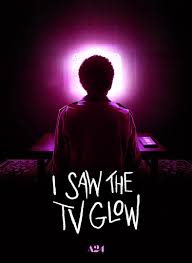
I SAW THE TV GLOW
US, 2024, 100 minutes, Colour.
Justice Smith, Brigette Lundy-Paine, Ian Foreman, Helena Howard, Lindsey Jordan, Danielle Deadwyler, Fred Durst.
Directed by Jane Schoenbrun.
Certainly a provocative title. And, alluring for those who love television and are caught up in its worlds. It has been billed as a horror film but that sets up expectations which may not be fulfilled and distracts an audience from trying to discern what kind of film it actually is.
The first comment is that it has divided opinions, right down the middle, many declaring it is one of the most boring films they have ever seen, finding it incomprehensible, many, on the other hand, praising its originality, its insight into youth and absorption into fantasy with consequences on real life.
Another approach would be that young audiences who are on its wavelength, identify with the characters, not only their response to the glow of television and television series, but in their personal issues, especially of family and parental experiences, loneliness and isolation, identity, gender and sexual identity. Older audiences may find themselves in a state of observing with interest, rather than identifying with the characters and the action.
The film was the work of writer-director, Jane Schoenbrun, who has given the number of interviews about their perspective on the film and its creation, its relationship to the director’s own life, awareness and decisions about gender identity and transitions.
The story opens in 1996, two high schoolers, Maddy (Brigitte Lundy-Paine), morose but strong minded, who lives with an abusive father, Owen (Justice Smith who tells the story and is the focal character) who lives with his parents, a stern father, she two years older than he. What brings them together is an interest in a television series, The Pink Opaque (with reference to the series, Buffy, the Vampire Slayer). Two loners meet and discuss their experiences and lives, Maddy attracted to girls, Owen unsure, attracted to the television series. The possibility arises that they could run away from home, Maddy doing so, Owen staying.
There are two time lapses during the action which jolt the audience, Maddy’s return after eight years, absorbed in the series, partly living the fantasy, the audience seeing some of the fantasy characters. Owen, on the other hand, has a humdrum life, works in the theatre which now closes down and he has to move to a fun fair.
Then a gap of 20 years, Owen, the same but visibly older, adapting his life, trapped in the memories, and a literal scream of desperation.
Which means then that the director offers a story and treatment and then it is over to us make of it what we will, what we can.
- The title, television and its impact, American audiences, younger audiences, teenage audiences, the 1990s setting, Buffy the Vampire Slayer and its influence? The repercussions as protagonists grew older? The Pink Opaque?
- The time settings, the mid-1990s, advancing two years, the gap of eight years, then 20 years and the sudden jolt for audience attention? The later years?
- The perspective of the writer-director, her comments about her own life experience, gender and transgender, growing awareness, consequences?
- The story of Owen, quiet, character, physical and psychological conditions? His age, at school, observing Maddy, her reading the book about The Pink Opaque, the discussions, friendship, his wanting to see the episodes, his curfew at home, going to her house, the excuse of the sleepovers, later visiting the mother of his former friend for her support? The effect of watching the episodes, their coming to life, the various characters, the girls, the villains each week, Mr Melancholy and appearances, Owen absorbed?
- Maddy’s story, family, abusive stepfather, wanting to leave, her age, befriending Owen, her disappearance? The sexual orientation, conscious, choices, to leave family in town?
- Maddy giving Owen the VHS cassettes, his watching them, absorbed, the characters, the stories, the mythology? Effect on him?
- Owen, relationship with his mother, African-American family, severe father, dismissing The Pink Opaque as for girls, remaining in the town, getting the jobs, quiet, his appearance, hair, slender, looking at himself in the mirror, the issue of relationships, girls, identity, male/female?
- Maddy’s return after eight years, her story about her jobs, her life, and living within the episodes of the show, the characters, their behaviour? Revealing this to Owen? His reactions, watching the show, smashing his head in the television set, his father saving him?
- Owen, staying at home, reticent, working in the movie theatre? The closure of the theatre, going to work in the Fun Park?
- The passing of time, Owen getting older, grey hair, stooped, nondescriptive existence? 2026, the outburst at the fair, the desperate screaming, no response from people, his returning home, cutting his chest, the television set glowing within? His return and apology? Whatever his future?
- The effect on the audience in the style of storytelling, events, long conversations, realism, fantasy, intermingling of both, personal identity, gender and sexual identity, isolation?
Blink Twice
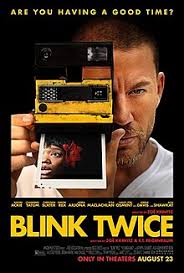
BLINK TWICE
US, 2024, 102 minutes, Colour.
Naomi Ackie, Channing Tatum, Alia Shawkat, Christian Slater, Simon Rex, Adriana Arjona, Haley Joel Osment, Liz Caribel, Levon Hawke, Geena Davis, Kyle MacLachlan.
Directed by Zoe Kravitz.
We, the audience, are invited, whether we like it or not, to take a trip to a Fantasy Island, a horror Fantasy Island.
This is a first film cowritten and directed by actress, Zoe Kravitz. She has invested a great deal of imagination and ingenuity to creating it. It is very much a film of the #MeToo consciousness of the last 20 years or so. And, it brings to mind the criminal behaviour of predator, Jeffrey Epstein, and judgements on him and his behaviour.
But, it doesn’t quite start that way. We are introduced to function cocktail waitress, Frida (Naomi Mackie) rapt in photos on her phone, idolising the guest of honour, Slater King (Channing Tatum in what eventually becomes a demanding role). The function is in honour of Slater King, his regrets for his behaviour in his business career, now a champion of philanthropy.
With his charm, Frida and her roommate, Jess, find themselves, as the audience does, on a plane to Slater’s island. For the next half hour, the guests, half a dozen young women, with some men friends on the island, have what they call a good time, no, “great time”, eating, drinking, gourmet food and alcohol, lazing by the pool, for days on end, losing a sense of time… (Audiences who would envy such a great time,
they will enjoy this hedonistic holiday; those for whom there is more in life than idling it away, it seems a very long time before anything really happens.)
Obviously, there is a danger of spoilers when the action gets going. Perhaps best to say that a key issue is the role of memory. Is it important to go back into the past to remember, to help with explanations of events in life? Or is it better to let the memories go and to move into the future? And so, with this shift in the drama, some of the guests remembering, disturbed by memories, decide to go into action to save themselves and others…
Which means then that the great time turns into something of a messy time and mayhem.
Blink Twice has quite a strong supporting cast including Alia Shawket and Adria Arjona as two of the young women, Christian Slater and Haley Joel Osment as two of the guests, Kyle MacLachlan as a psychiatrist, Geena Davis as something of the housekeeper of the island.
As might be expected, there is a challenging ending – and the audience having to go away to reflect on the #MeToo implications of what they have just seen.
- A film from the Me-Too# era? Women and men? Misogyny and exploitation? The island and audience memories of Jeffrey Epstein and his crimes?
- The film as reality and fantasy? Fantasy Island?
- The title, the reference to gaze, to photography?
- The introduction to Frida, the phone, the photos, swiping through, the photos of Slater King, the infatuation? Her friendship with Jess, roommates, shared experiences? The cocktail waitresses? At the annual event, memories of the previous year, the advice of their supervisor, to smile and mingle? Audience identification with the two young women? Younger audiences and identification? Older audiences observing?
- The story of Slater King, played by Channing Tatum, his reputation, his companies, change of heart, his repeated apologies, the celebration, the host, the guests, the speeches, food and drink, the dancing?
- Slater, the attraction to Frida, with her, her response, awkwardness, charm, the dancing, with Jess, the invitation to the island? Their leaving everything, the flight to the island?
- The island, a fantasy Island, the plane, the beauty of the island, the isolation, the main buildings, the grounds, the terrain, giving up the phones? Slater as host, his continued attention to Frida?
- The range of characters on the island, the young women, seeming friends, but not having met before, the response to Slater, their hopes? The men, Vic, older, his camera? Tom, short, baby-faced, indulgent? Cody, vain, pride in his cooking and announcements? Lucas, younger, thinner, hanger-on?
- The first 40 minutes, sensual, the accommodation, the clothes, everything available, the food and meals, the lighting, the drink, the drugs, the pool? “A good time”, “a great time”, hedonism, self-indulgence, the effect on the guests, Slater as host?
- The change in tone, the issue of Jess, her participation in the great time, but wanting her phone, wanting out, her cigarette lighter with her name, the disappearance, nobody remembering?
- The theme of memory, Slater and Frida and the discussions about memory, not going back into the past, erasing memories, living in the present to the future? The discussions with the therapist, at the party, his visit to the island, collusion with Slater?
- The mysterious local inhabitants, the old woman, Frida encountering her, not understanding her, the snake, the venom, the drinks? The local workmen? Those who served at the dinner?
- Frida, uncomfortable, memories of Jess, the friendship with Sarah, Sarah and her memories of being on television, Survivor, their working together, understanding the drinks, the issue of memory, the role of Slater, the other men? Frida and her searching Slater’s room, the photos? Under suspicion?
- The role of the other girls, caught up in the hedonism? The contrast with Frida and Sara, then manoeuvres, building to the set up, the mood to violence, the knives?
- The role of Stacy, older, housekeeper, her ditzy manner, dropping things, the issue of the armchair and its place, sometimes sinister presence, with the young women, her death?
- The uprising, the confrontation of the men, the stabbing of Cody, Tom in the pool, the attack on Vic, Lucas and his death?
- The role of the therapist, the danger, working with Slater?
- The unmasking of Slater, exploitation, his charm, his real character?
- The irony of the ending, the annual show, Frida in charge, control, Slater and his subservient presence? The future?
- A contemporary drama/horror/parable about men and women in the 21st-century?
Charmian Clift: Life Burns High
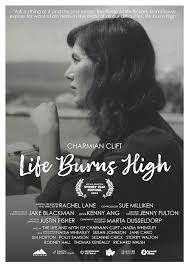
CHARMIAN CLIFT: LIFE BURNS HIGH
Australia, 2024, 80 minutes, Colour.
Voices: Marta Düsseldorp.
Directed by Rachel Lane.
Charmian Clift has a significant place in Australian literature. She published many books, a number in collaboration with her husband, George Johnston. She also wrote a significant column in Australian newspapers during the 1960s, stimulating ideas and discussions.
This documentary outlines the details of her life, her background, early career, marriage to George Johnston, family, their life in the UK, their life in the Greek islands, the return to Australia.
Underlying the narrative are many quotes from Charmian Clift’s writings, visually highlighted, as well as passages from her articles. These are voiced by veteran Australian actress, Marta Düsseldorp. And the film is able to use a great deal of footage from her movies, television interviews and programs, excerpts from the television series both 1965 and 2001 from the novel, My Brother Jack.
There are many commentators, their contributions to advantage in the film. A narrative is supplied by official biographer, Nadia Wheatley. There is significant commentary from poet Rodney Hall who spent time with his wife and family with Clift and Johnston. There is also commentary from novelist, Thomas Kenneally. There is vigorous comments from writer, Jane Caro. There is also material from the director of My Brother Jack and journalist Richard Walsh.
The film highlights the family growing up in Kiama the 1920s and 30s, military background of the family, Charmian and her education, her use of the military, writing for the military papers, catching the eye of a publisher from the Melbourne Argus, the success of her writing, the encounter with celebrated war correspondent, George Johnston, the affair, his separation from his wife, the couple marrying, moving to the UK, his successful career there, her pregnancies and looking after children, his office affair.
The two collaborated in their writing, then made the significant move to Greece, life in the island, support from a local businessman, increasing number of visitors, and artistic colony, the significant visit of Leonard Cohen and its influence on his relationship and future, many publications, the children growing up speaking and thinking in Greek, but many clashes, and Charmian having affairs.
With Johnston’s success, especially with My Brother Jack, the family returned to Australia. It was here that Charmian had great success and influence in Australia with her columns, in the women’s section of the papers, sponsored by Grace Bros, but increasingly read, discussed.
But, there were health difficulties, George, antibiotics, smoking, lung difficulties, collaboration with Charmian, but also fighting. Ultimately, George wrote Clean Straw for Nothing which, with its fictitious character based on his wife, is condemnatory of her, indicating that she was responsible for his health collapse. And, then, a depressed Charmian commits suicide.
The film is a portrait of Charmian, a lesser a portrait of George Johnston, but a visit to the Greek islands and their influence on the family, and the social change in unrest in Australia in the mid-1960s.
South Sudan’s Australian ‘angel’ served the poorest of the poor, Moira Lynch OLSH
South Sudan’s Australian ‘angel’ served the poorest of the poor, Moira Lynch OLSH
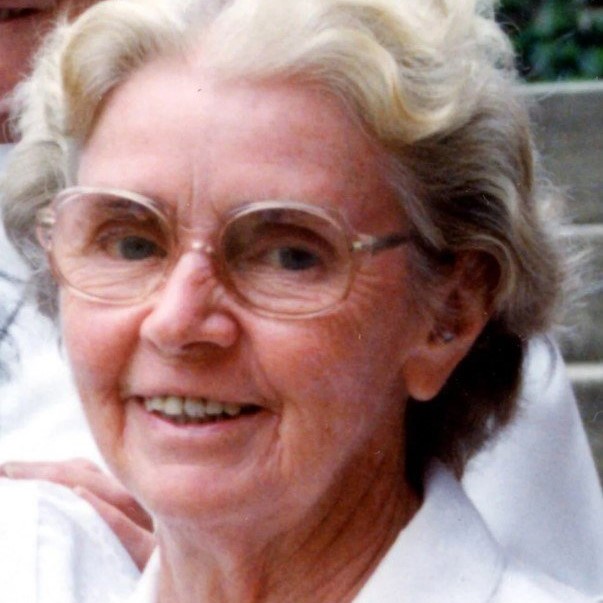
Sr Moira Lynch FDNSC, who in her 70s left Sydney to serve the poorest of the poor in war-torn southern Sudan, has been recognised in her regional hometown’s walk of fame. Source: The Catholic Weekly.
Sr Moira Lynch’s nephew, Brian Flinn, and Sr Philippa Murphy FDNSC with the plaque honouring Sr Moira.
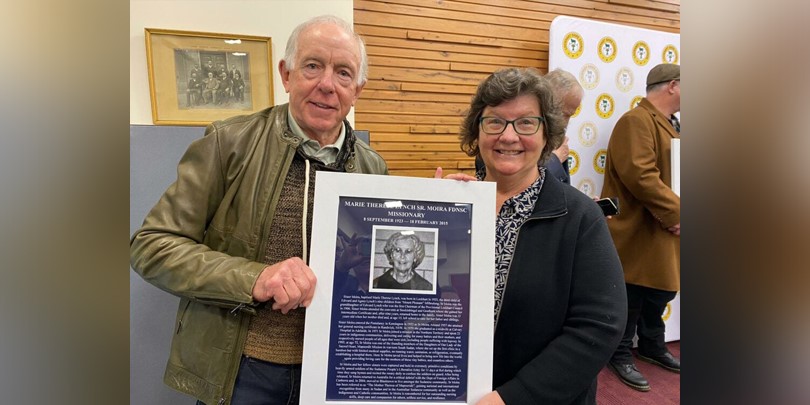
Sr Moira’s incredible life story will be added to the memorial in Walter Day Park at Lockhart, southwest of Wagga, which recognises residents who achieved greatness in their chosen field and made a valuable contribution to Australian life.
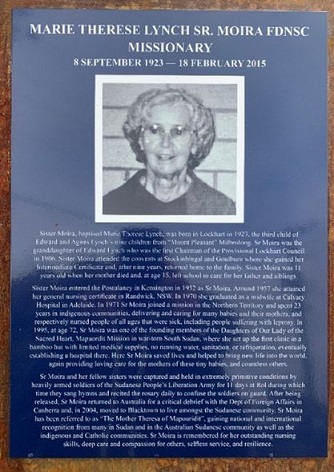
Known and loved as the “angel” and even the “Mother Teresa of Mapuordit,” the member of the Daughters of Our Lady of the Sacred Heart had already given a lifetime of service to her family, her order, and indigenous communities in the Northern Territory when she left Australia in 1995.
Alongside Sr Jo Kenny, she was a founding member of the order’s mission to Mapuordit in the Diocese of Rumbek in Sudan.
With just one cardboard box of medical supplies, and no running water or electricity, the trained nurse set up the diocese’s first health clinic in a dirt-floor bamboo hut.
The following year she was arrested by armed soldiers of the Sudanese People’s Liberation Army with fellow religious Sr Maureen Carey and Sr Mary Batchelor.
The trio were accused of spying, along with three other missionaries, and held captive for 11 days.
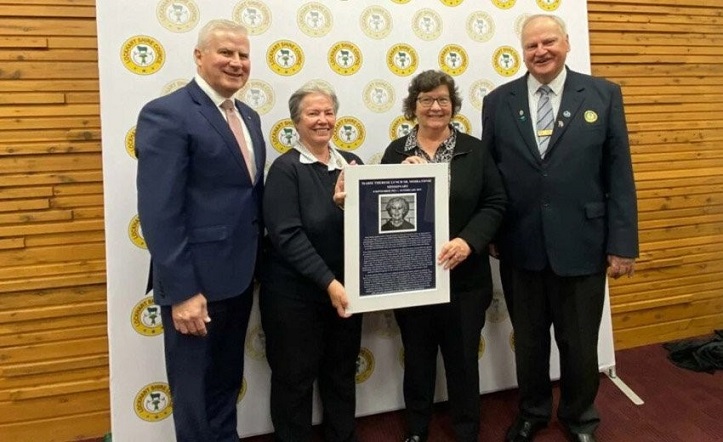
A plaque featuring Sr Moira’s inspiring life story and her photo were unveiled last month in Lockhart along with those of former deputy prime minister Tim Fischer, transport magnate Raymond Burkinshaw, and rugby league legend Norm “Sticks” Provan.
Members of her religious community, the large Lynch clan and Sudanese representatives travelled from across the country to attend the ceremony led by local mayor Greg Verdon and attended by federal Member for Riverina Michael McCormack, who said the prominently displayed stories will inspire people for generations to come.
Provincial leader Sr Philippa Murphy FDNSC said Sr Moira, who died in 2015, and her contemporaries were “amazing, amazing women who lived in very poor conditions to serve the poorest of the poor”.
2024 MSC Mission Alive in South Sudan, acknowledging MSC and OLSH missionaries
2024 MSC Mission Alive in South Sudan, acknowledging MSC and OLSH missionaries
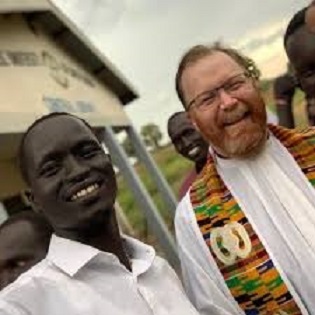
Continuing the work of Alan Neville MSC, Irish Province, in South Sudan
A New AcademicYear
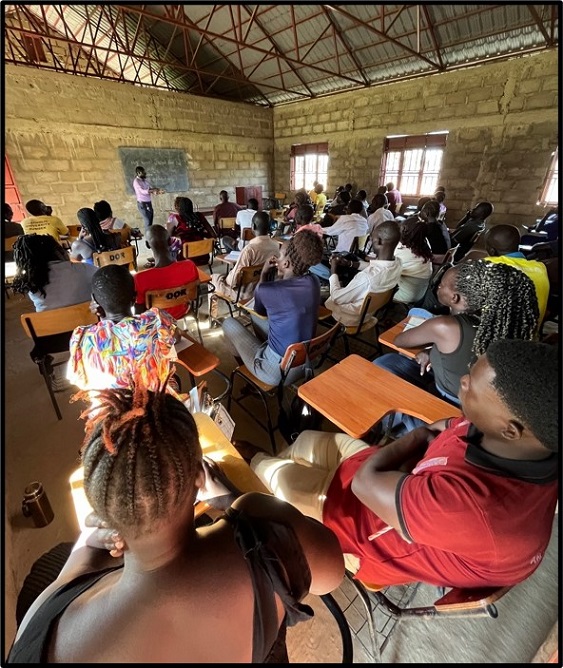
It’s all go as usual in the Catholic University of South Sudan, Rumbek Campus. As we are approaching the end of one year, we are already in full swing getting organised for the next. The University is small, but growing and we are committed to seeing it flourish. Earlier this month, we launched a promotion programme for our new intake. We arranged a series of Facebook ads, printed flyers, put posters up around town, made Church announcements, and hosted two radio talk shows with our students.
Without a doubt our students are our best adverts and promotors. Many of our new applicants have come through their personal recommendation. Their collaboration is essential and invaluable. However, we are faced with two significant challenges right now. The first is that the basic educational attainment level remains low.
There is still a great deal of investment needed in primary and secondary education. According to the UN, South Sudan has the lowest expected school attendance in the world at just 5.6 years on average.
This is why the work ofthe University in training professional, qualified teachers is so imperative.In addition, there has been significant inflation since the beginning of the year, reaching 320% since January. This means that finding money for University fees is especially difficult. To this end we have worked to make them as low as possible and continue to offer a partial scholarship to women. For many, it is still not enough.
Fostering Bodyand Mind
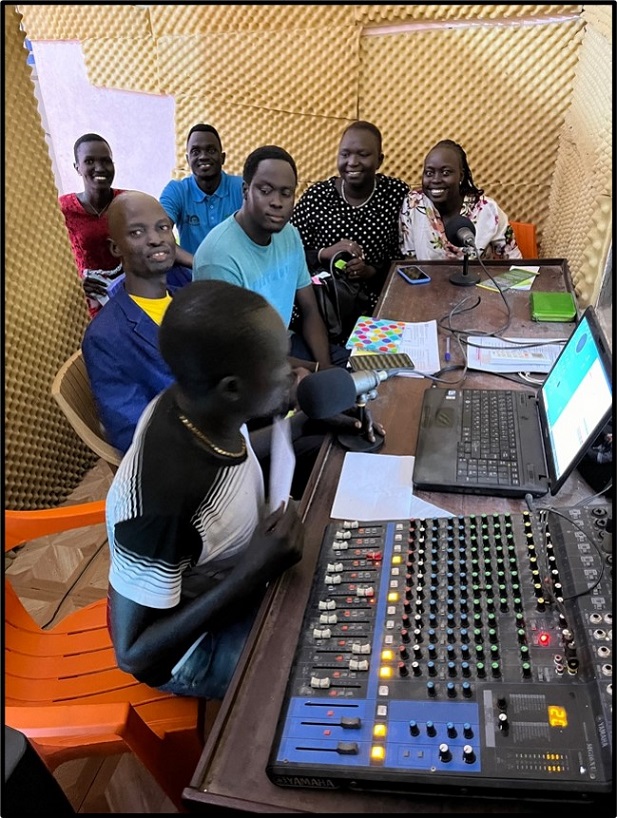
It is not enough to just educate our students, we also need to attend to their complete wellbeing.
Here that means addressing issues like Hepatitis B. Seventy percent of all new global infections of viral hepatitis B and C occur in sub-Saharan Africa due to insufficient interventions and the rate in SouthSudan is a real problem. Hepatitis mortality remains high due to low treatment coverage.
To this end, we have been working with the Mary Ward Primary Health Care Centre to test and vaccinate all of our students and staff who wish to take part. Those who are found to be Hep. B carriers are referred onwards for further treatment. Three out of four students and staff have already received their first dose, with second due later this month, and the third in September.
Get that Job!
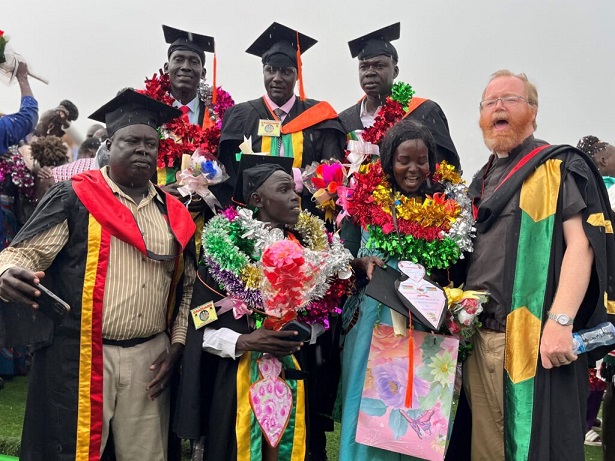
As mentioned already, the South Sudanese economy is struggling and opportunities for employment are few and far between. Any time there is a job posting the response is immediate and overwhelming, with many not even been shortlisted,let alone interviewed!
To support our students we arranged a workshop on interview technique with a member of Caritas, one of the largest organisations working in South Sudan. He worked with them on the essentials of best practice, good preparation, effective communication, and strong presentation. The attendance by students was enthusiastic, with standing room only for latecomers. If given half the chance they have the drive and creativity to really shape and change the economy and their community for the better. Such sustainable economic development by South Sudanese themselves is at the heart of our vision for the University.
Full House
This week our end of year exams began and will continue until the end of the month. Around the campus student study groups are running as they prepare for tests in managerial accounting, African literature, computer literacy, entrepreneurship and innovation, economics, and ethics. All our first and second years sat my Church history exam yesterday and the stack of their uncorrected scripts are staring at me balefully from across the office. It’s perhaps the only aspect of lecturing I do not enjoy … to put it mildly!
While the exams continue, we are also welcoming our new first year students.
They will begin their bridging course tomorrow, which is comprised of eight weeks of intensive maths and English to help them as they start their third level studies. All going well they will be ready to begin their first courses by the middle of October.
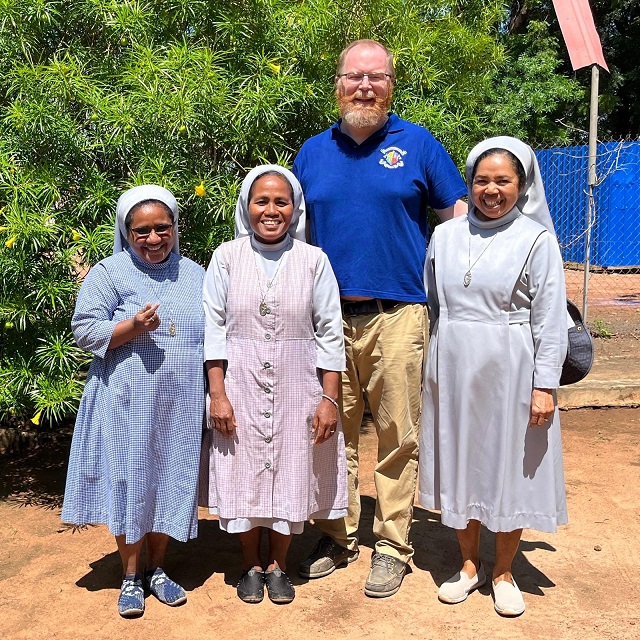
Nhialic ke yin(God bless you as they say here),
Fr. Alan Neville msc
Director
CUSS Rumbek
Randwick parish, a Farewell and a Welcome
Randwick parish, a Farewell and a Welcome
Farewell to Thang Nhu
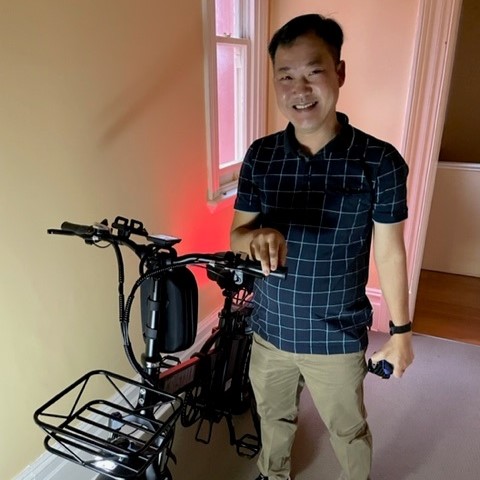
We will miss Thang Nhu, who left Sydney on July 20th, 2024, to return to Vietnam. Thang was the first of our MSC brothers to minister in Australia. He arrived in 2017 and attended the Siloam programme at Heart of Life. He was then appointed to St Mary’s Towers Retreat House to join the Retreat Team. He was there for 18 months. After this, he moved to Coogee, where he was involved in promoting vocations, giving retreats to the Vietnamese Community and assisting in the parish. His last appointment was as Chaplain to Prince of Wales Hospital. (The photo above has him ready to go to the hospital.) Thang, thank you for your presence and ministry in Australia. Safe travels home, and keep supporting the Blues and the Swans and keep eating vegemite.
Welcome to Br Julson Ribauw MSC

Julson (Julson Andrew Ribauw, date of birth, 15 November 1992, Nauru Island, Professed: 8 December 2017, MSC - PPI) arrived from the Province of the Islands and is settling into OLSH Presbytery Randwick. He is here for a pastoral experience in the Parish. The process of obtaining his Visa has been a lengthy one, but you are here now and we welcome you. Thanks to Michael Nithan MSC for the photo and information.
150 years celebrations, Kensington, Bentleigh, Pacific Islands
150 years celebrations, Kensington, Bentleigh, Pacific Islands
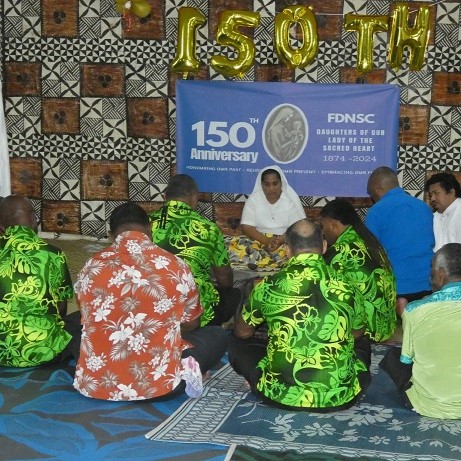
- and if you would like to see more (many more) photos of these celebations, visit the Facebook pages of the MSC Vocations - Australian Province, the Daughters of Our Lady of the Sacred Heart and the Province of the Pacific Islands (and for the Kiribati celebration)
First, an official greeting.
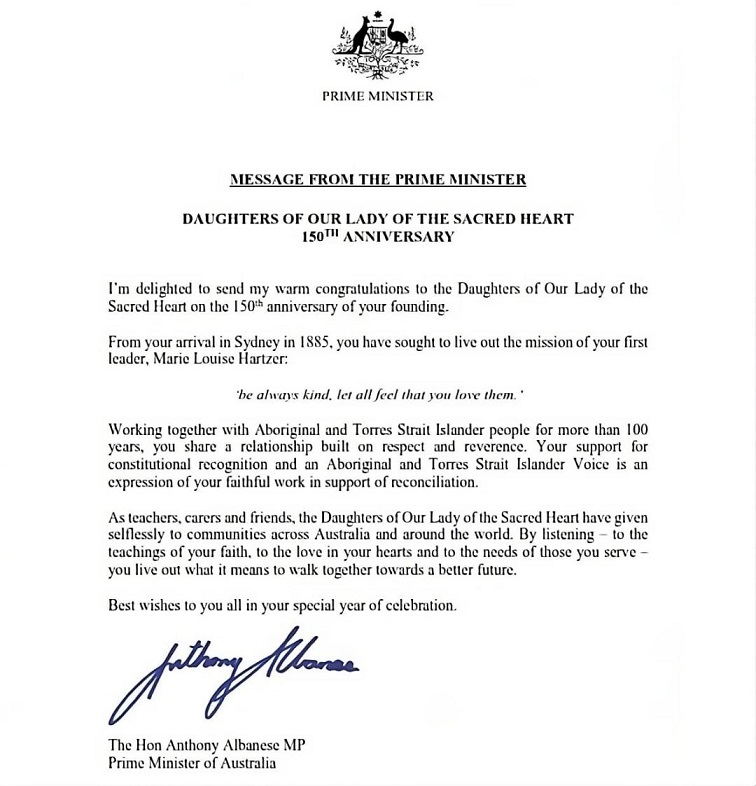
Jubilee Eucharist at OLSH College Kensington.

Our Eucharist was celebrated by Emeritus Auxiliary Bishop of Sydney Terry Brady DD, Fr. Stephen Hackett MSC (Provincial), MSC Fathers, and Diocesan Priests.
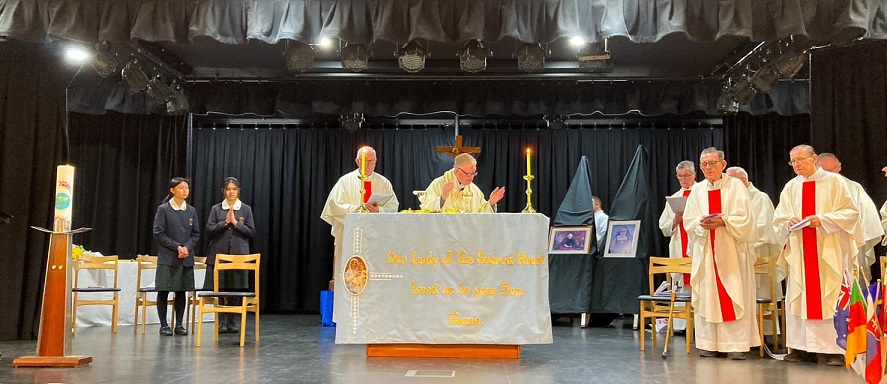
We are grateful to all who joined us, especially The Hon. Matthew Thistlethwaite MP, Federal Member for Kingsford Smith, and Councillor Philipa Vietch, Mayor of Randwick.
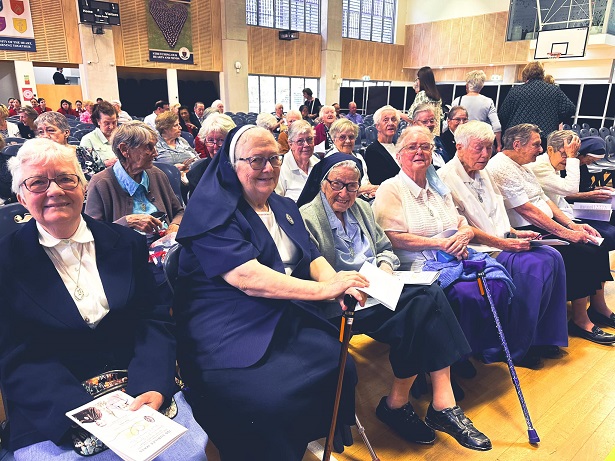
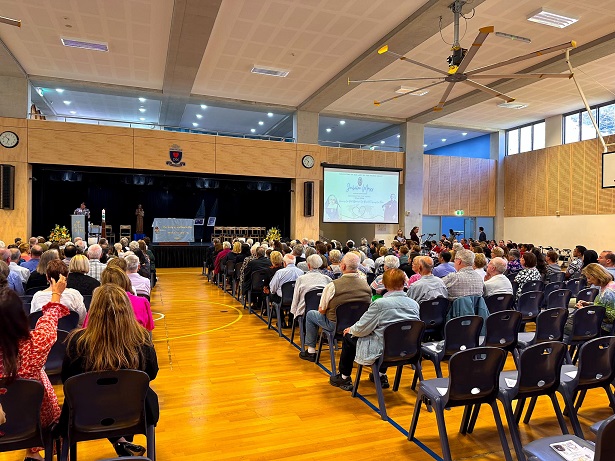
Mass at Bentleigh,
OLSH Sisters, MSC Sisters, OLSH Laity, Liz Taylor welcoming,
Philip Malone preaching,
Peter Malone presiding,
Carole Barwick and
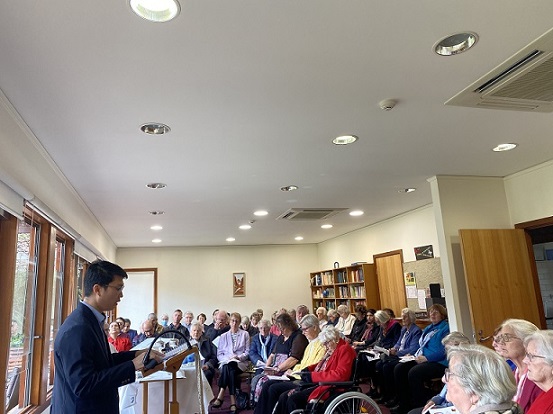
Hoa Tran reading –
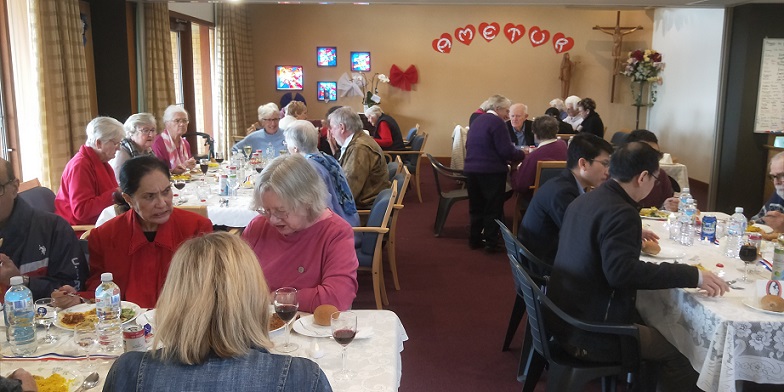
and the gathering.
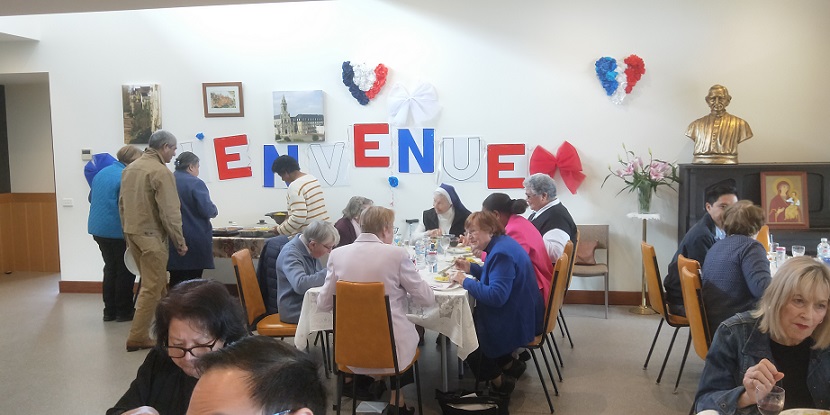
Mass
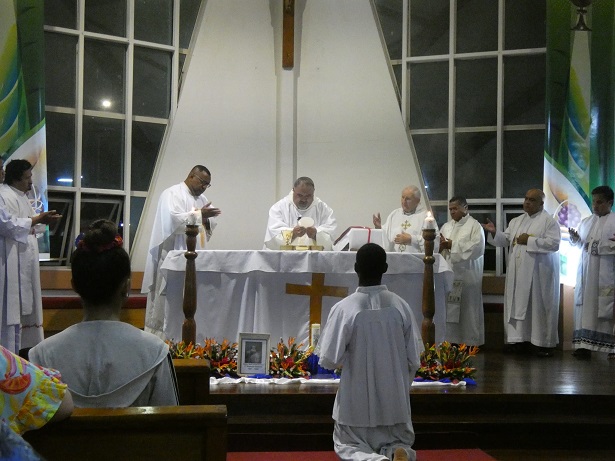
and celebration
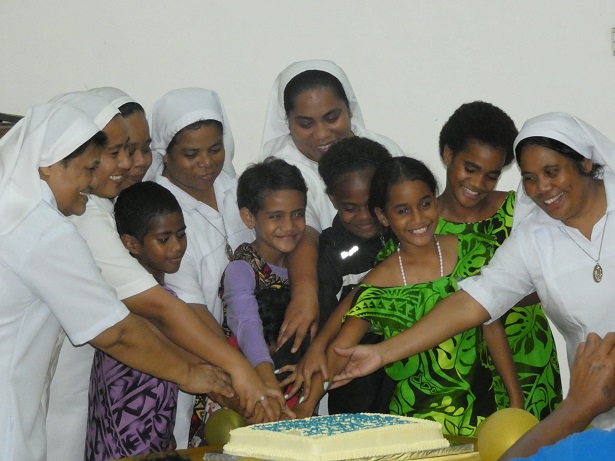
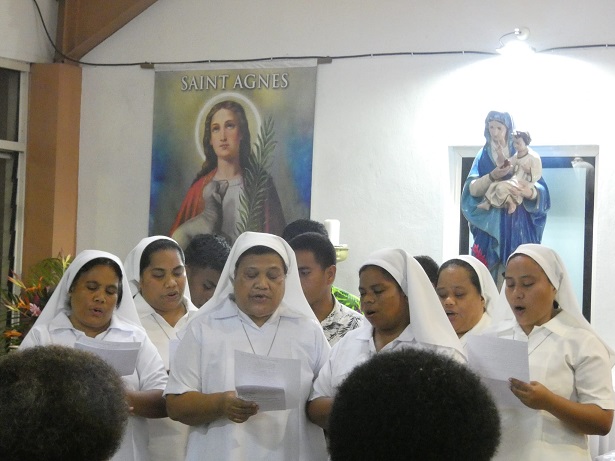
in the Pacific Islands – and a glimpse of the feast.
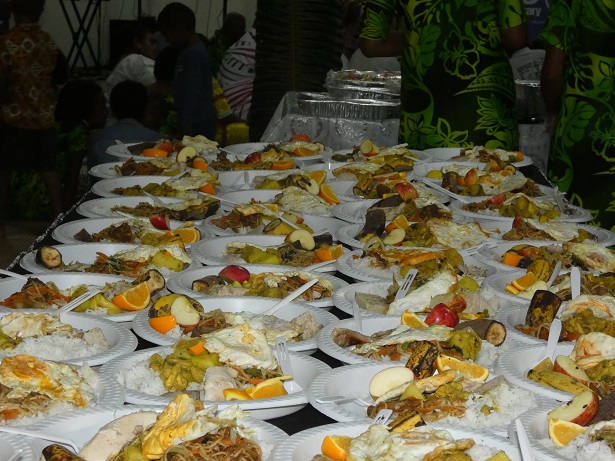

Today, August 30th, 150 years, Daughters of Our Lady of the Sacred Heart
Today, August 30th, 150 years, Daughters of Our Lady of the Sacred Heart
![]()
Below, the statement of the Daughters of Our Lady of the Sacred Heart - and an international photo celebration
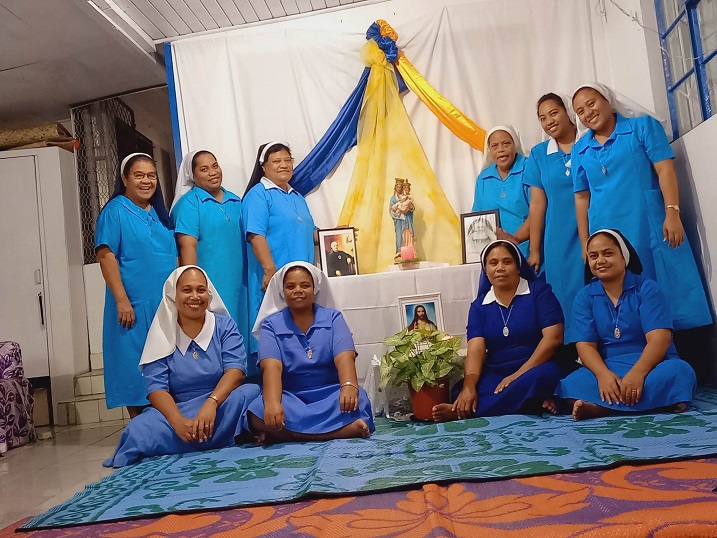
Kiribati
We, the Daughters of Our Lady of the Sacred Heart, are an international, apostolic religious institute of pontifical right with a specific missionary orientation. Centred on the Heart of Jesus, ours is a Spirituality of the Heart with a special Maria dimension. Our spirituality and mission are expressed in the motto given to us by our Founder: “May the Sacred Heart of Jesus Be Everywhere Loved”. (FDNSC Constitutions No 1)
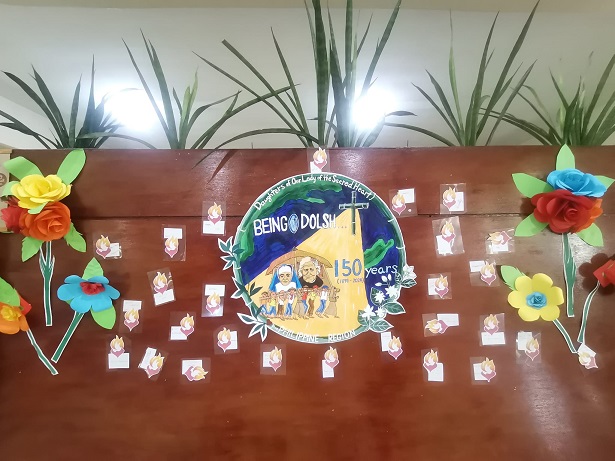
Philippines
We were founded in Issoudun (France) on 30 August 1874 by Fr Jules Chevalier, MSC who personally guided the congregation in its first years of existence. In 1882, our first superior general, Mother Marie Louise Hartzer, FDNSC joined the young congregation and embarked on faithfully passing on to the early sisters the charism and spirituality of the founder.
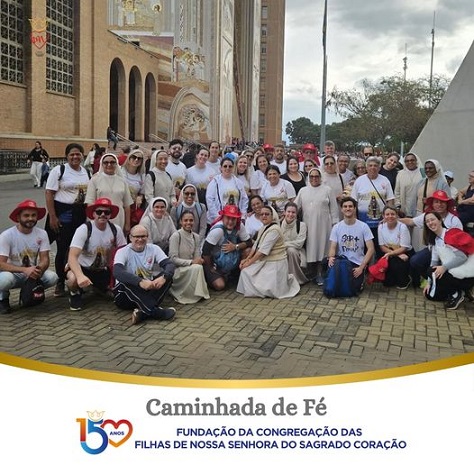
Brazil
Today, we look back with gratitude over our 150 year history of making the Sacred Heart loved everywhere. On the following pages, we will tell you more about Our Lady of the Sacred Heart, our patron; Fr Jules Chevalier, MSC, our founder; Mother Marie Louise Hartzer, FDNSC, our first superior general; and our Charism, Spirituality and Mission.
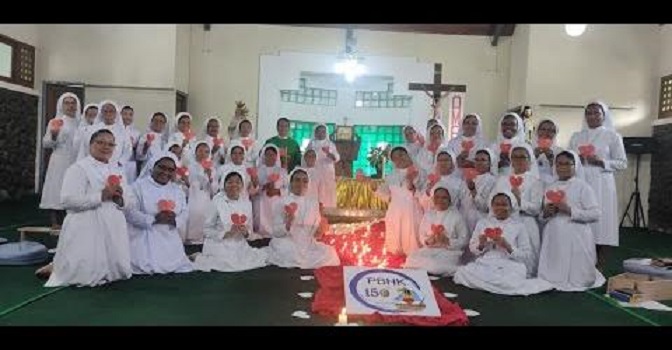
Indonesia
Our first Superior General, Mother Marie Louise Hartzer, was born in Alsace, France in 1837 and died in Thuin, Belgium in 1908. She first married, had two sons, and later as a 45 year-old widow, joined the young congregation of the Daughters of Our Lady of the Sacred Heart. Her two sons became Missionaries of the Sacred Heart. For 26 years (1882-1908), she led our congregation, faithfully passing on the founder’s charism and spirituality to the sisters. She saw the congregation expand from Europe to the Pacific, becoming a truly international congregation.
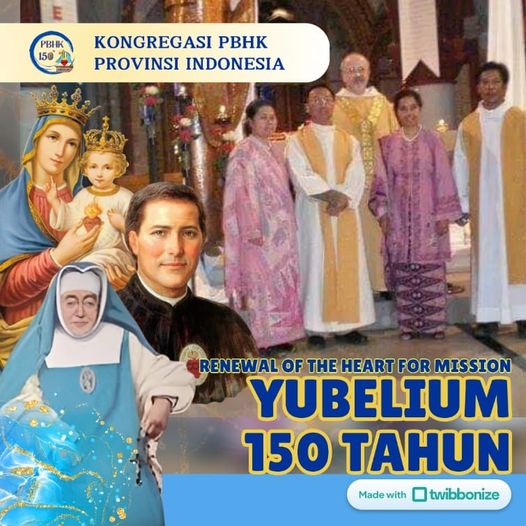
Korea
“As Father Chevalier, by the exercise of his spiritual paternity, has given life to the Congregation, so Marie Louise Hartzer by the grace of spiritual maternity bestowed up her for the purpose of fostering that life, may be called and is its venerated Mother.” (Mary Venard, fdnsc, The Designs of His Heart)
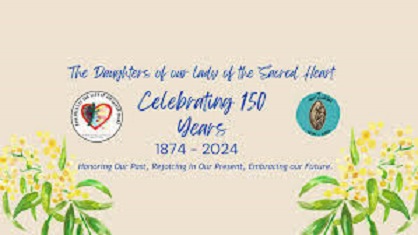
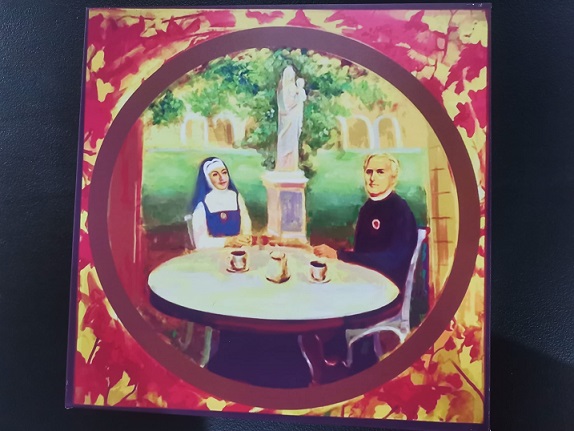
Sylvester Warwakai MSC anticipating Pope Francis’ visit to PNG, September 6th-9th
Sylvester Warwakai MSC anticipating Pope Francis’ visit to PNG, September 6th-9th
Missionaries of the Sacred Heart of Jesus in PNG provide education and health services to remote communities from L’Osservatore Romano. Superior General Abzalon was also interviewed about MSC and PNG can be found on our site, July 12th 2024.
The Catholic Church has played a key role in Papua New Guinea’s education and health sectors, which face numerous challenges due to a lack of government support. It’s what Father Sylvester Warwakai, Provincial Superior of the Missionaries of the Sacred Heart of Jesus in Papua New Guinea Province, said in a phone interview.
The Missionaries are currently working in seven dioceses contracted to parish work, teaching and nursing. Most of the parishes where they work have a school attached because, as Father Warwakai explained, schools are crucial to the development of the Catholic faith.
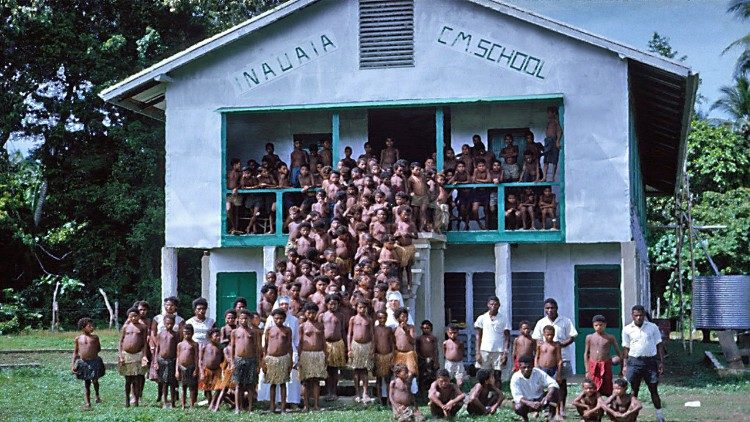
The Missionaries do not own any facilities; rather, they work in collaboration with the dioceses and within the existing framework.
Father Warwakai explained that the work of the Catholic Church is especially important in hard-to-reach rural areas with no government services. “We do not work in the hinter highlands region of Papua New Guinea; however, we have missions in most rural parts of the country. Currently two of our parishes in the mountain regions of Bereina and Kerema Dioceses are St. John Vianney Parish, Tapini and Sacred Heart Bema, respectively. They have schools, both primary and high school and Health Care Facilities.
They come under the Catholic Education Secretariat and Catholic Health Services of both dioceses but are administered by our priests and brothers. Due to the deteriorating condition of the road networks, the only means of transport to get to both mountain parishes is plane”. He lamented that for the last 20 years “the health services and the education system have failed in many ways because there is very little government support in terms of the subsidy that is committed to the Church-run institutions, especially health and education. Sometimes those subsidies don’t arrive on time, and for schools, they simply close”.
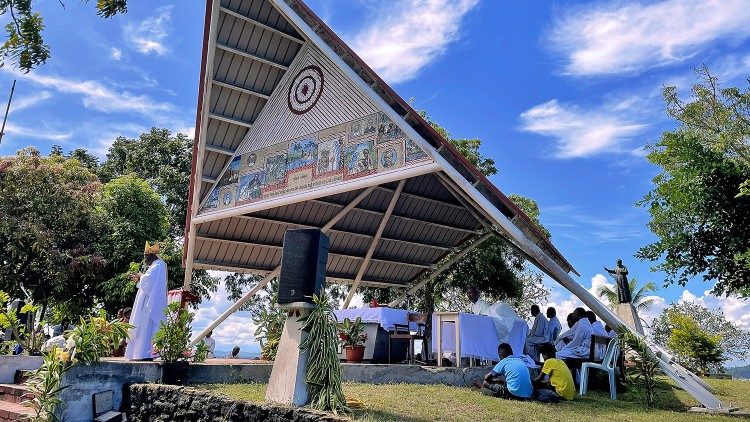
As for health facilities, Father Warwakai explained that sometimes they don’t receive the government funds necessary to buy medicine, which results in “people dying from curable diseases”. Often, he added, these facilities have to scale down their operations, and “they only attend to certain cases that are very life-threatening, like mothers giving birth or someone who is going to die of malaria”. Father Warwakai expressed his concern that this problem of limited resources and financial support is creeping into cities and other rural areas.
He said much of the limited help the Missionaries of the Sacred Heart receive comes from abroad, including from agencies in Australia and Europe. “We improvise with what we have, even though it isn’t sufficient”, he lamented.
Turning then to Pope Francis’ upcoming trip to Asia and Oceania, which will include a stop in Port Moresby, the capital of Papua New Guinea, from 6 to 9 September — broken up by a short visit to the city of Vanimo on 8 September — Father Warwakai said it “will give some sense of belonging, hope and some optimism” to the Missionaries who minister to the Papuan communities, as well as to other dioceses and institutions outside the capital city.
Sylvester lived with us at Blackburn while he studied at YTU. He then went to Rome.
